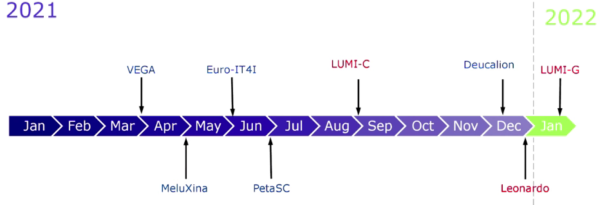In 2021, Europe is aiming to break the Top500. Nearly two years ago, EuroHPC – the Joint Undertaking (JU) that serves as the European Union’s coordinated supercomputing play – selected eight host countries to host its first eight systems. Now, one pandemic and hundreds of millions of euros later, those bets are paying off. In a session at the 2021 EuroHPC Summit Week, Evangelos Floros, a program officer for the JU, was joined by representatives from seven of the eight host countries to offer details on all but one of the imminent systems.
The roster
 Of the eight announced EuroHPC systems, five will be decidedly petascale. These include Discoverer (newly named!), hosted by Bulgaria, at 6 peak petaflops (4.2 Linpack); Vega, hosted by Slovenia, at 6.8 peak petaflops; Deucalion, hosted by Portugal, at 10 peak petaflops; Karolina (newly named!), hosted by Czechia, at 15.2 peak petaflops (9.1 Linpack); and Meluxina, hosted by Luxembourg, at 18 peak petaflops. These petascale systems will be co-owned by the JU and the host, as the JU provided a minority (35%) of the funding, with the host providing the remainder.
Of the eight announced EuroHPC systems, five will be decidedly petascale. These include Discoverer (newly named!), hosted by Bulgaria, at 6 peak petaflops (4.2 Linpack); Vega, hosted by Slovenia, at 6.8 peak petaflops; Deucalion, hosted by Portugal, at 10 peak petaflops; Karolina (newly named!), hosted by Czechia, at 15.2 peak petaflops (9.1 Linpack); and Meluxina, hosted by Luxembourg, at 18 peak petaflops. These petascale systems will be co-owned by the JU and the host, as the JU provided a minority (35%) of the funding, with the host providing the remainder.
This quintet is complemented by a trio of pre-exascale systems: Leonardo, hosted by Italy, at 249 Linpack petaflops; LUMI, hosted by Finland, at 550+ peak petaflops (375 Linpack); and the as-yet mysterious MareNostrum 5, hosted by Spain. All three pre-exascale systems will be owned by the JU, which provided 50-50 funding for each system.
On the manufacturer side, meanwhile, Europe-based Atos is leading the pack with four of the detailed systems (Discoverer, Leonardo, Meluxina and Vega); U.S.-based HPE has two (Karolina and LUMI); and Japan-based Fujitsu is manufacturing Deucalion.
AMD is dominating the EuroHPC CPU race, with its CPUs present in at least five of the detailed systems: Deucalion, Discoverer, LUMI, Meluxina and Vega. Leonardo will use Intel CPUs, while Deucalion – the lone Fujitsu system – will use Fujitsu’s Arm CPUs in addition to AMD CPUs. (Details on Karolina’s CPUs were not provided.)
AMD GPUs, on the other hand, are only powering one of the systems so far, albeit the most powerful (LUMI). Nvidia snatched the rest of the GPU announcements, with inclusions in five systems: Deucalion, Karolina, Leonardo, Meluxina and Vega.
The committed costs of the contracts so far: a whopping €360 million ($425 million), of which €163 million ($193 million) is to be provided by EuroHPC.
The roadmap
 Vega – The first stop on the timeline is easy: Slovenia’s Vega system has already been delivered, installed and tested, making it the earliest of the EuroHPC systems. Software installation, benchmarking and acceptance are currently in progress. IZUM, the host institution for the system, says that production is scheduled for March 31st, 2021.
Vega – The first stop on the timeline is easy: Slovenia’s Vega system has already been delivered, installed and tested, making it the earliest of the EuroHPC systems. Software installation, benchmarking and acceptance are currently in progress. IZUM, the host institution for the system, says that production is scheduled for March 31st, 2021.
Meluxina – Meluxina is another of the earlier arrivals, with hardware deployment ongoing since January 2021 and installation scheduled to complete any day now (March 2021). Acceptance is planned for April 2021, with a production target of May 2021.
Karolina – The IT4Innovations National Supercomputing Center in Czechia says that hardware installation for Karolina has been ongoing since December, and most of the system – with the exception of its accelerator partition – had already been installed as of February 2021. Partial acceptance is scheduled for April 2021, with final acceptance scheduled for June 2021.
Discoverer – Discoverer, to be housed in the Sofia Tech Park, is being transported and delivered this month (March 2021). Installation will continue over the next couple of months, with testing (and Top500 benchmarking) scheduled for May 2021 and acceptance planned for June 2021.
Deucalion – The Minho Advanced Computing Center (MACC) didn’t offer many details on Deucalion, which MACC Director Rui Oliveira said was expected “to be ready by the end of the year, and to be available to the EuroHPC network early in 2022.” Floros, for his part, slates Deucalion’s delivery for December 2021.
Leonardo – CINECA, which will host Leonardo, is aiming to install the hardware for the system’s “booster” module (which, despite the name, comprises the vast bulk of the system’s planned petaflops) by August 2021 and complete configuration and testing by December 2021. The much smaller data-centric module, meanwhile, is targeted for hardware installation in Q1 2022 and finalization in Q2 2022.
LUMI – CSC, the host institution for LUMI, is aiming to finish preparing the datacenter for the supercomputer by Q1 2021. After that, “LUMI-C” – its CPU-only module – and much of the rest of the system are slated for deployment in Q3 2021. “LUMI-G,” the GPU-powered module, will have to wait until Q4 2021 (or, per Floros’ timeline, Q1 2022).

The bird’s-eye view – and what’s next
Napkin math puts the seven detailed systems around 855+ peak petaflops in aggregate, with all of them likely to land in the Top500 and both Leonardo and LUMI likely to land in or near the top ten.
All of this, of course, is without making much mention of the as-yet undetailed MareNostrum 5, the third pre-exascale EuroHPC system. The Barcelona Supercomputing Center (BSC), which will host MareNostrum 5, said in mid-2019 that it would be a heterogeneous system with a peak performance of 200 petaflops and that it will include an experimental platform intended to develop new technologies for future supercomputers.
In October 2020, Anders Jensen – executive director of EuroHPC – said that “the tendering process [for the third pre-exascale system] is in its very final phase … so there will be announcements on that in the coming weeks.” But as of this week, the tagline is still “coming soon”: “the only procurement that’s currently pending is … MareNostrum 5 … which is still an ongoing process,” Floros said.
Past the pre-exascale systems, of course, are the exascale systems. While details on these systems are few and far between at the moment, EuroHPC did confirm that it plans to select host entities in 2021 and is targeting the 2023-2026 period for deployment of two exascale systems: one in the front half of that timeline and the second in the latter half.


























































